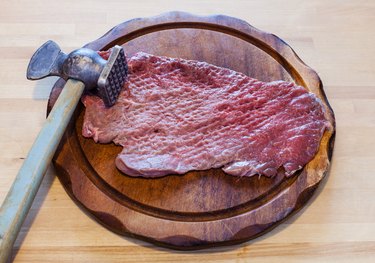
Certain cuts of beef are tougher than others because of the muscle and connective tissue. High temperature and overcooking can cause any cut of beef to become tough because heat can cause the muscle fibers to contract. When the meat becomes too tough, you need to know how to tenderize cooked meat.
Read more: How to Cook a Tender Steak on the Stove
Video of the Day
Video of the Day
Tenderize a tough roast that's already cooked by pounding it, cutting it against the grain, adding some marinade or commercial tenderizing agents or braising the meat. Reheat cooked beef to at least 165 degrees Fahrenheit to reduce risk of harmful bacterial growth, as advised by the USDA.
Pound or Cut It Up
The basic methods for tenderizing beef make meat more tender — even cooked beef. Pounding the beef with a meat mallet can tenderize steak as it helps to break down the muscle fibers to make them softer.
Cutting against the grain — a common practice for flank steak and skirt steak — results in meat that's easier to chew, and it reduces the meat's toughness. Cutting the meat into small cubes or thin slices helps moisture and tenderizing products to work more effectively.
Add Marinade or Tenderizer
Marinating a tough steak or other piece of beef can make it more tender, according to Michigan State University. Choose marinades that are acidic, such as a marinade containing vinegar or citrus.
According to the USDA, beef can be marinated in the refrigerator for up to five days. Cut the cooked beef into thin strips to help the marinade penetrate the meat fibers to soften them.
Although commercial tenderizing products might help, they're less effective on cooked beef than raw meat. Their tenderizing improves exposed surfaces of the meat, so the middle will remain tough. Using an injector designed for marinades or tenderizer can help these solutions penetrate the meat.
Try Braising to Tenderize Steak
Braising breaks down the collagen, the tissue that connects to meat fiber. This results in softer meat. Braising requires adding moisture, such as broth, wine or ale, to the beef.
Adding vinegar to the liquid in a braising pot or other shallow cooking pot with a tightly fitting lid increases the tenderizing effect. It's important to simmer the meat slowly in the oven at lower temperatures because high heat can make the meat tougher, according to the University of Nebraska-Lincoln.
Read more: How to Cook a Chuck Roast Perfectly
Tips to Tenderize Cooked Meat
A braising pan or a shallow pot with a lid that fits tightly give the best results for braising. Deep pans allow more steam to form and dilute the meat stock. Using a slow-cooker appliance or simmering the beef in a skillet with a lid that fits also works for tenderizing cooked beef.
Thinly slicing or shredding the beef helps the meat break down faster. Braise or simmer it for at least two hours. Avoid dry cooking methods, such as frying or broiling, or using high-temperature cooking, as these methods can make the muscle fibers contract even more.